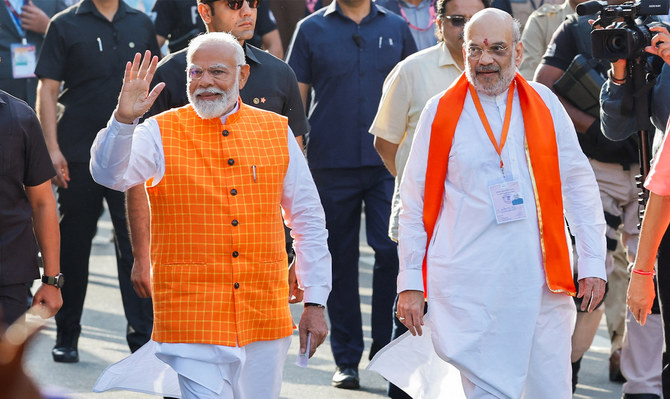
Election in India: Inside the BJP and Modi strategy to secure a supermajority
Narendra Modi’s picture is on everything from big banners in cities and villages to packets of rice distributed to the underprivileged during India’s six-week general election.
In its quest for a super-majority in the Indian parliament, the prime minister’s popularity is being relied upon by his Bharatiya Janata Party (BJP). Its argument is that Modi has raised India’s international stature while delivering economic development and infrastructure improvements.
However, in addition to targeting 400 of the 543 seats in India’s lower house of parliament (up from 352 won in 2019), the Hindu nationalist party and its allies are also using local strategies in several crucial seats they want to seize from the opposition.
When voting concludes on June 1, opinion polls suggest that Modi will secure a rare third term. However, a party has only ever exceeded the 400 threshold in Indian history once, and that was when the center-left Congress party easily won after its leader Indira Gandhi was assassinated in 1984.
Reuters spoke with nine National Democratic coalition (NDA) officials, three opposition leaders, two political analysts, and voters in six opposition-held seats that the coalition is aiming for in order to analyze how the right-wing alliance hopes to accomplish that feat and the challenges it confronts.
They named three of the main strategies employed by the BJP: using celebrity candidates to depose long-serving opposition lawmakers; attacking the opposition’s strongholds in the south by making appeals to minority groups like Christians; and taking advantage of redrawn political boundaries that benefit the Hindu electorate in some opposition-controlled areas in the north.
The head of the BJP’s electoral strategy, J. P. Nadda, told Reuters in April that “a combination of strategies, organizational commitment and tactical flexibility will help make inroads in seats never held by the party ever before.”
A few detractors have cautioned that if the BJP wins a third term, they will exploit their huge majority to ram through a more extreme agenda. The BJP has promised to do away with different legal codes for religious and tribal groups in areas like marriage and inheritance, even as its agenda places a strong emphasis on economic growth.
The proposal, which calls for a constitutional modification to be approved by at least two-thirds of parliament, is opposed by a large number of Muslims and tribal groups.
Mallikarjun Kharge, the head of the Congress party, told Reuters that Modi “wants a landslide majority only to be able to end the debate and deliberation on any policy matter in the parliament.”
Though the BJP still hopes to establish the next government, several campaign officials have expressed less confidence in obtaining a sizable majority in the wake of low turnout in the early vote.
All Categories
Recent Posts
Tags
+13162306000
zoneyetu@yahoo.com



